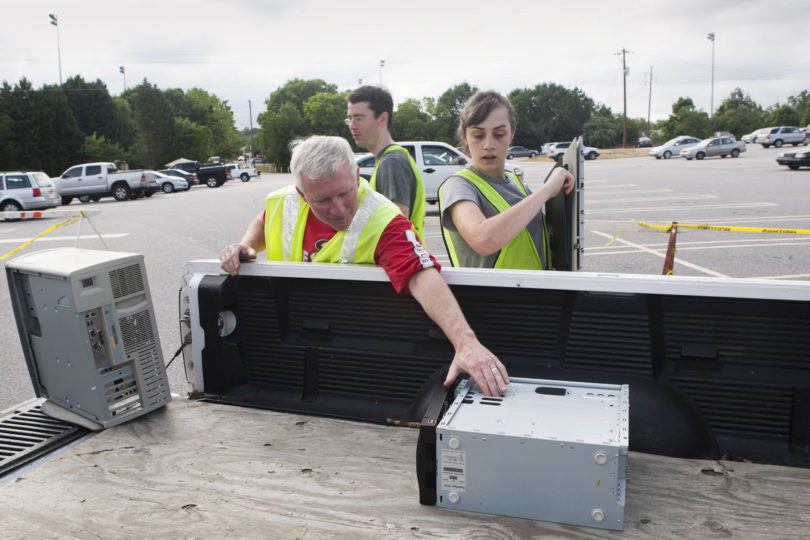Many of UGA’s ongoing efforts to promote sustainability in the university community and beyond begin with the innovative ideas of students, faculty and staff.
Graham Pickren was a doctoral candidate in the geography department when he proposed ways to expand electronics recycling.
Recycling unwanted electronics is still an afterthought in American society, said Pickren, now a geography instructor in the Franklin College of Arts and Sciences.
To address the issue on campus, Pickren applied for an Office of Sustainability grant in 2012 to bolster programs for electronic recycling. Sustainability grants provide financial and staff resources to implement student-initiated projects that further the university’s sustainability goals.
The result was the development of two annual programs still going strong. Pickren partnered with Athens-Clarke County officials to implement a campus Recycling Happy Hour, an event that collects electronics and other hard-to-recycle materials for reuse and recycling. The 2013 event diverted 70 televisions and more than 2,000 pounds of electronics materials from the landfill.
Pickren also collaborated with UGA Housing, students from Hillel at UGA and others to expand the Dawgs Ditch the Dumpster Move-Out Donation to include unwanted electronics.
Pickren said his ideas were not novel.
“All you need is someone to spearhead the recycling effort, drive it forward and get the right people in the room,” Pickren said.
Pickren is just one example of how members of the university community use innovation and a little gumption to improve sustainability efforts at UGA and beyond.
As an institution, UGA aims to address issues of sustainability through education, research, operations and engagement, said Kevin Kirsche, director of UGA’s Office of Sustainability.
“We are making a lot of progress in many different areas,” Kirsche said.
Much of the innovation toward sustainability comes through education and research. There are more than 660 faculty members at UGA whose research, broadly speaking, engages in sustainability, according to the Office of Sustainability. Like Pickren, other faculty members not only study problems but look for practical solutions.
In addition, UGA offers 115 sustainability-related degree programs and 18 certificates.
The UGA community also increasingly is finding ways to reduce waste, water and energy use in campus operations. Among those initiatives:
• New campus construction and renovation projects are required to meet sustainable design and construction standards that reduce construction waste, reduce energy and water consumption, and identify renewable energy sources.
• UGA also has been a leader in using green cleaning products to create healthier interior environments on campus.
• A food waste-composting project is underway at Joe Frank Harris Commons dining hall to reuse food scraps in fertilizing campus landscapes and community gardens. That project is a collaboration between the Office of Sustainability, UGA Food Services and Facilities Management’s services and grounds departments.
Efforts also are underway to decrease UGA’s carbon footprint. The university’s strategic plan calls for a 20 percent reduction of carbon emissions by 2020 and a reduction in energy consumption by 25 percent. Using more renewable sources of energy is part of that equation.
Currently, about 20 percent of UGA’s carbon footprint comes from a central steam plant, which is partially fueled by coal.
“The good news is that we’ve been reducing our reliance on coal in recent years, in fact our use of coal has gone down by almost two-thirds since 2008,” Kirsche said. “Hopefully in the future, we’ll be able to identify economically feasible solutions to replace the current coal-fired boiler.”
A feasibility study currently is being conducted by a third-party contractor to deliver a detailed evaluation of options for replacing the coal-fired boiler-reducing carbon emissions and long-term operating costs while still providing effective and reliable service to the UGA campus.
A Climate Action Planning Task Force, made up of faculty, staff and students, plans to include these findings and other emissions-reducing strategies in an action plan for UGA.
In addition to these operational efforts, the Office of Sustainability also engages the campus community through opportunities like the sustainability grants, which are funded through $3-per-semester ($2 for summer) student green fees. Since 2011, sustainability grants have pledged $87,000 to 26 student-initiated projects. Like Pickren’s efforts, these grants have led to a number of institutionalized sustainability projects such as the Tanyard Creek Chew Crew and Bulldog Bikes.
The Chew Crew, established in 2012 by landscape architecture student Zach Richardson, created a targeted goat grazing effort to weed out invasive species at Tanyard Creek. Bulldog Bikes is a bike-sharing program started in 2011 to provide an environmentally friendly transportation option on campus.
Looking at the big picture, Kirsche said, one of the most promising aspects of the university’s conversation about sustainability is how pervasive the topic is in discussions about UGA’s future.
“Sustainability is a factor in teaching, research, campus development and operational decisions,” Kirsche said. “We are creating a culture of sustainability at UGA.”





